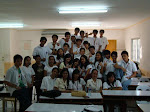
Course Code: ENGLISH 106
Course Title: Technical Writing
Course Description: This course aims to develop the student’s ability in effective construction of business correspondence and technical reports.
Credit: 3.0 units
General Objectives: This course covers the study of the language, facts and mechanics of business correspondence. It also provides students with the vocabulary and techniques of business and technical communication.
Specific Objectives: At the end of the semester, the students are expected to:
To understand and apply the principles of effective communication in English in the different professions, which allows for the integration of knowledge and skills
To understand and apply the genre approach to effective communication in the different professions, which leads to an awareness of the conventions that form the discourse of various disciplines
To demonstrate critical skills in the evaluation, and revision of materials taken from the different professions
T o demonstrate an awareness of the dynamics of communication in the Philippine workplace
Course Outline:
I. Principles of writing
A. Qualities of effective writing
B. Communication models
C. Purposes for writing
II. Nature of Technical Writing
A. Definition and Its Characteristics
B. Aspects and Style in Technical Writing
C. Basic Principles
D. Qualities of a report writer
E. Types of Technical Articles
III. English in the Professions: an analysis and evaluation of the language and format of specimen writings in the different professions
A. Science and Technology
B. Social Sciences
C. Business
D. Law and Diplomacy
E. Medicine
F. Media
G. Arts
IV. Forms of written and spoken communication in the different professions
(Choices from the following to be determined by the class and the teacher)
A. Pre-professional transaction (application letters, resumes, cover letters, telephone follow ups, interviews)
B. Office correspondence (meetings, minutes, memoranda, office forms)
C. Business letters (inquiry, complaint, sales of products/services/ ideas/systems, etc.)
D. Reports (scientific, technical, field reports; business reports, feasibility studies, [business] case studies, market studies, marketing plans, proposals, annual reports)
E. Legal documents and briefs
F. Medical reports and (medical) case studies
G. Technical Papers in Engineering and Sciences
V. Enhancements in communication
A. Visual aids (graphs, tables, charts, etc.)
B. Strategic and cultural designs
C. Language elaboration, refinement, and control
Requirements
written exercises on selected forms listed under IV
documented report (using statistics, graphs, field work, etc.)
critique of specimen writings
oral reports
participation in class and group discussions and activities
Grading System: The following shall be used as the basis for giving grades:
Class Standing 70 %
Term Examinations/Papers 30 %
100 %
The final grade will be computed based on the 50-50 policy (50% of the midterm and 50% of the tentative final grade)
Class Policies:
No late submissions of any required papers will be entertained.
Students who submit copied/copyrighted works shall be given a final grade of 5.0.
Anyone caught cheating during exams shall be recommended to the University Guidance Office. Grade for that particular exam shall be automatically 5.0.
Wearing of proper uniforms and IDs during class period is a must for proper identification.
Attendance will be checked regularly. In case where attendance is not possible, inform the instructor through formal letter. Any other means (i.e. text message, etc.) will not be entertained.
Required Readings:
To be determined by instructor according to his/her thematic inclinations, thus also falling in line with the course’s spirit of flexibility
REFERENCES
Alcantara, Rebecca D. and Felicidad P. Espina, Technical Writing for Filipino Students. (Manila: KAtha Publishing Co., Inc, 1995)
Baraceros, esther L., Business Correspondence, 1st Ed. (Manila: Rex Bookstore, 2000)
Portillo, Reynaldo R. Research and Technical Writing, 2003
Technical Writing for Scientists and Engineers
Andrews, Deborah C. and William D. Andrews. BUSINESS COMMUNICATION. 2nd ed. New York: Macmillan.
Fein, Richard. COVER LETTERS! COVER LETTERS! COVER LETTERS! Singapore: S.S. Mubaruk and Brothers.
Journet and Kling. READINGS FOR TECHNICAL WRITERS II. 1984.
Littlejohn, Andrew. COMPANY TO COMPANY: A NEW APPROACH TO BUSINESS CORRESPONDENCE IN ENGLISH. 2nd ed. Great Britain: Cambridge University.
Rozakis, Laurie. MERRIAMWEBSTER'S RULES OF ORDER. Springfield, Massachusetts: Merriam-Webster, 1994.
Prepared by:
Mr. NOMER N. VARUA
Instructor I
nemesis_bpsu@yahoo.com
nomer1202@gmail.com
+639202721372


No comments:
Post a Comment